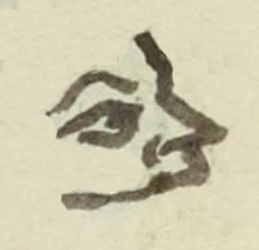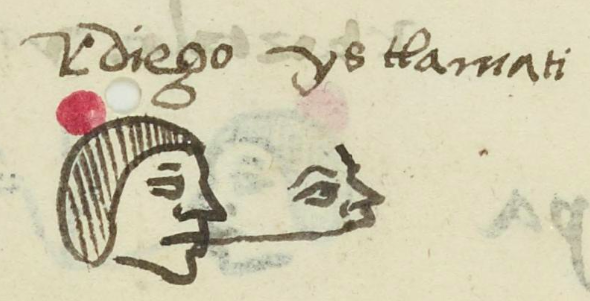Ixtlamati (MH616v)
This black-line drawing of the simplex glyph for the personal name Ixtlamati ("He is Wise") is attested here as a man's name. The glyph shows a partial human face in profile, facing toward the viewer's right. The most prominent feature of the face is the eye (ixtli) which can be a phonetic indicator of the start of the name, but it also plays a semantic role.
Stephanie Wood
Vision and knowledge have a close relationship. The name seems to derive from tlamati (also spelled tlamahti, with the glottal stop, “to know something” or to "practice trickery or sorcery." However, the added translation of sorcery and trickery reveals a Christian bias on the part of the friar Alonso de Molina. At the root of tlamati is the verb mati, to know. Marc Thouvenot (2010, 178–181) explains how iximati (which can become imati, to manage cleverly or create skillfully; and this compares to mati (to know). Imati involves knowing through seeing, much like conocer might indicate in Spanish, and mati is "to know" as in saber in Spanish. In both the verbs starting ix- or i-, the sign for eye is a semantic indicator for a place of wisdom.
diego ystlamati
Diego Ixtlamati
Stephanie Wood
1560
Jeff Haskett-Wood
Sabiduría, sabios, conocimiento, visión, ojos, nombres de hombres

ixtlamati, to be wise, prudent, https://nahuatl.wired-humanities.org/content/ixtlamati
ix(tli), eye, https://nahuatl.wired-humanities.org/content/ixtli
tlamati, to know something, or to know sacred powers (verb), https://nahuatl.wired-humanities.org/content/tlamati
tlamatini, a sage, wise person, scholar, https://nahuatl.wired-humanities.org/content/tlamatini
El es Sabio
Stephanie Wood
Matrícula de Huexotzinco, folio 616v, World Digital Library, https://www.loc.gov/resource/gdcwdl.wdl_15282/?sp=315&st=image.
This manuscript is hosted by the Library of Congress and the World Digital Library; used here with the Creative Commons, “Attribution-NonCommercial-ShareAlike 3.0 License” (CC-BY-NC-SAq 3.0).





